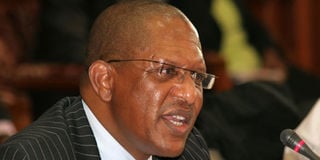Why Tobiko nomination was flawed

Keriako Tobiko during the vetting by MPs at County Hall in Nairobi. The process of nominating Mr Tobiko for the position of Director of Public Prosecutions was flawed, the chairman of the Constitutional Implementation Oversight Committee, Mr Abdikadir Mohammed admitted June 10, 2011. STEPHEN MUDIARI
The process of nominating Mr Keriako Tobiko for the position of Director of Public Prosecutions was flawed, the chairman of the Constitutional Implementation Oversight Committee, Mr Abdikadir Mohammed admitted Friday.
In a startling acknowledgement a day after Mr Tobiko’s name was forwarded to Parliament for endorsement, the CIOC chairman said recommendations had been made to ensure future approval hearings were more effective.
Concerns are centred on the process that resulted in the nomination of Mr Tobiko by an interview panel chaired by Central Organisation of Trade Unions secretary general Francis Atwoli, which forwarded the name to the House team.
It is understood that the committee agreed that the process was not properly conducted, was not transparent and should have been conducted in the same way the Judicial Service Commission had gone about the interviewing of the candidates for the office of Chief Justice and the deputy.
While a majority of the CIOC team voted to approve Dr Willy Mutunga for Chief Justice and Nancy Baraza for Deputy Chief Justice, it was split down the middle on Mr Tobiko.
The CIOC chairman told the Saturday Nation Friday the team addressed the issue during deliberations on the nominees and recommended that the process needs to change in the future.
“One of the recommendations in our report is that whoever nominates a person should explain the process they went through. A dossier on the person would also be needed,” said Mr Mohammed.
This dossier, said Mr Mohammed, would enable the MPs in future to answer the critical questions about the process, performance record and integrity of the nominees.
A report of the National Security Intelligence Service is usually considered crucial during the vetting process as well as investigations on allegations about the nominees.
Mr Mohammed said the committee failed to get evidence from the NSIS on the basis that the panel that forwarded Mr Tobiko’s nomination would have done that.
The office of DPP is one of the new powerful and independent positions created by the new Constitution and enjoys security of tenure.
The Constitutional Implementation Oversight Committee approval of the nomination has effectively transferred the battle over the 46-year-old lawyer’s qualifications for the position to the entire Parliament.
The unanswered questions over Mr Tobiko’s nomination revolve around the openness of the process he went through and the variety of claims that were made against him.
Most questions about the man who could become Kenya’s first Director of Public Prosecutions under the new Constitution were raised by members of the civil society.
The most potentially damning allegation was made by former Local Government permanent secretary Sammy Kirui, who claimed that Mr Tobiko had used proxies to demand Sh5 million from him, without which he tripled the charges in a case he is currently facing. The committee is understood to have recommended that a law should be developed to make the interview and vetting process transparent.
Some members of the committee are understood to have proposed that the team takes more time to investigate the veracity of the claims by Mr Kirui.
The committee’s report will recommend that the claims be investigated further and the truth established, Mr Mohammed said, and that means the matter is not closed.
But there was also the feeling that the committee should have initiated the investigations to avoid the mistake of approving Mr Tobiko’s nomination and later finding that the claims are true.
“The likelihood is that once we have said that in the report and the person’s nomination is approved, the report will be quickly forgotten,” said Mr Mbadi.
Mr Mohammed said the team struggled with the allegations against Mr Tobiko before settling on making the recommendation in the final report.
The chairman was forced to ask the Speaker for additional time on Wednesday afternoon when it became clear they needed a longer period for the vetting with the fresh claims against Mr Tobiko.
He said Friday the committee would have required more time than the deadline set by the Speaker to investigate fully the claims by contacting the mobile phone companies involved.
But Mr Mbadi said given the importance of the position and the enhanced role of the DPP in the new Constitution, the committee should not have acted in haste to make its recommendations.
Among the challenges a Tobiko tenure would face is his involvement in the Anglo-Leasing cases, where he was defence counsel for former Internal Security permanent secretary Zakayo Cheruiyot.
Senior counsel Joe Okwatch was appointed to lead the prosecution when Mr Tobiko was appointed DPP in 2005.
The man Mr Tobiko succeeded at the State Law Office, Phillip Murgor, argued that the Anglo- Leasing cases would collapse once his predecessor ascends the position.
The reasoning here is that given the fact that the DPP’s powers are enhanced in the new Constitution, there would be a direct conflict of interest if he prosecutes the cases.
Those he intends to prosecute could also argue that having acted for a suspect in the same cases, Mr Tobiko bears a conflict of interest that would be prejudicial to the case.
COTU Secretary General Francis Atwoli headed the panel that interviewed and later nominated Mr Tobiko, Dorcas Oduor and Patrick Kiage for the post.
The members of the panel are: A-G Amos Wako and PSs Francis Kimemia (Internal Security) and Amina Mohamed (Justice).
Others are Caroli Omondi, Principal Administrative Secretary at the Office of the Prime Minister, Law Society of Kenya chairman Kenneth Akide and Florence Kajuju, the society’s vice-chairman.




